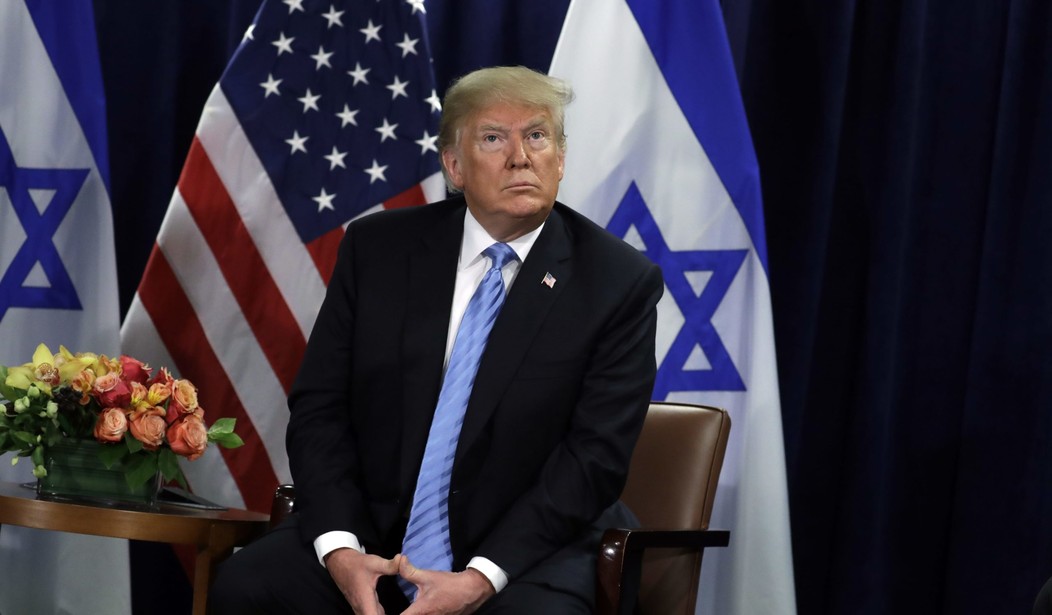President Donald Trump has taken five dramatic, unprecedented pro-Israel measures. They’re not the only factors that make him popular in Israel; others include his withdrawal from the Iranian nuclear deal and his sanctions on Iran and its proxy Hizballah. But those aren’t moves directed at Israel specifically. The explicitly pro-Israel moves include:
1. Declaring Jerusalem to be Israel’s capital and moving the U.S. embassy to Jerusalem
Congress passed the Jerusalem Embassy Act in 1995; Presidents Clinton and Bush, as candidates, vowed to move the U.S. embassy to Jerusalem, and President Obama, as a candidate, criticized them for not doing so—and then didn’t do so himself. Candidate Trump promised to “move the American embassy to the eternal capital of the Jewish people, Jerusalem”—and President Trump did so. It’s deeply appreciated in Israel.
2. Cutting aid to UNRWA and the Palestinians
Trump, much more than any past president, has let the Palestinians know that there is no free lunch—that they cannot, along with their UN ally UNRWA, cultivate generations of Israel-hating “refugees” and cannot incentivize and reward terrorism while continuing to receive aid. Last year the administration cut funding to UNRWA and put the Palestinians on notice about U.S. aid and their pay-to-slay policy. Congress advanced its own initiative, and this year, fearing lawsuits in the U.S. over Palestinian terror attacks that have killed Americans, the Palestinian Authority itself requested—and “got”—a major aid cut from the administration.
3. Recognizing Israeli sovereignty over the Golan Heights
The Golan Heights, captured by Israel from Syria in the 1967 Six-Day War, are a major strategic asset that shields Israel against aggression from its northeast; Israeli law was extended to the Golan in 1981. True, Israeli leaders—though always opposed by a majority of the public—have nevertheless made diplomatic efforts to trade all or part of the Golan for a chimerical “peace” with Syria. But since the Syrian civil war erupted in 2011—turning the country into a cauldron of violence and terror—those efforts, and dreams, have ended. This week President Trump, in an unprecedented move, signed a proclamation affirming: “the United States recognizes that the Golan Heights are part of the State of Israel.” The entire Israeli political spectrum, including Prime Minister Netanyahu and the opposition striving to unseat him in the April 9 elections, applauded.
4. Boosting the Israeli right-of-center candidate in an election campaign
U.S. policy has tended to favor the Israeli left-of-center out of an incorrigible belief that Israel needs to offer plums—in the form of territorial concessions—to its foes. Former President Clinton has publicly admitted trying to help the left in Israel’s 1996 elections, and the Obama administration used taxpayer money to do the same in Israel’s 2016 elections. Trump, for his part, with the current Israeli campaign in full swing last month, called Netanyahu “tough, smart, and strong” and said he had “done a great job as prime minister.” Trump’s highly public signing of the Golan proclamation with Netanyahu at his side also hardly hurts Netanyahu’s chances.
5. Ceasing public criticism of Israel
The Trump administration has put a stop to the practice—engaged in by previous administrations including Republican ones—of subjecting Israel, alone among democratic allies, to frequent public criticism. Incredibly to anyone who has been watching U.S.-Israeli relations for years, even the State Department has stopped putting the rap on Israel. The current administration has backed Israel’s military moves and has not portrayed Israel as a bully and an oppressor. True, Trump has yet to unveil his “deal of the century” for supposed Israeli-Palestinian peace, but recent reports suggest that the “deal”—which in any case, given Palestinian intransigence, has no chance of getting off the ground—will not make unreasonable demands on Israel.
To sum up, Trump treats Israel the way other U.S. allies, especially democratic ones, are treated—with support and respect. That means recognizing its fundamental values (Jerusalem) and its security needs (the Golan), treating its enemies (Iran, Hizballah, UNRWA, the Palestinians) as the enemies they are, esteeming its leader (Netanyahu), and providing public backing instead of castigation. It’s a very welcome change.









Join the conversation as a VIP Member